【英语】一般过去时(完整版)
一般过去时单词表
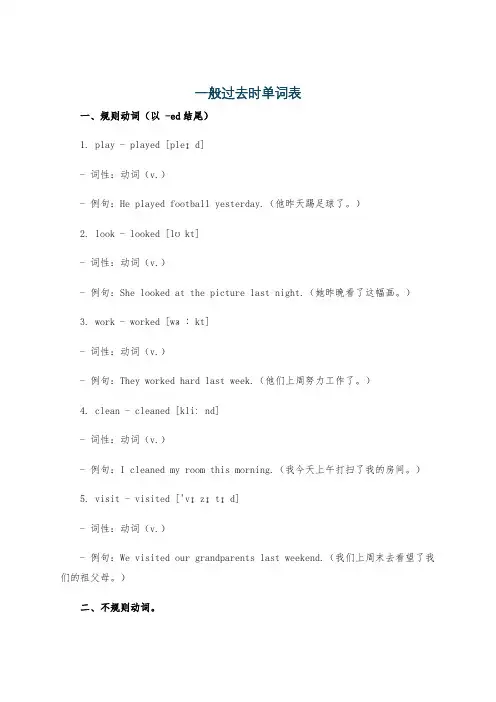
一般过去时单词表一、规则动词(以 -ed结尾)1. play - played [pleɪd]- 词性:动词(v.)- 例句:He played football yesterday.(他昨天踢足球了。
)2. look - looked [lʊkt]- 词性:动词(v.)- 例句:She looked at the picture last night.(她昨晚看了这幅画。
)3. work - worked [wɜːkt]- 词性:动词(v.)- 例句:They worked hard last week.(他们上周努力工作了。
)4. clean - cleaned [kliːnd]- 词性:动词(v.)- 例句:I cleaned my room this morning.(我今天上午打扫了我的房间。
)5. visit - visited ['vɪzɪtɪd]- 词性:动词(v.)- 例句:We visited our grandparents last weekend.(我们上周末去看望了我们的祖父母。
)二、不规则动词。
1. go - went [went]- 词性:动词(v.)- 例句:He went to school by bike yesterday.(他昨天骑自行车去上学了。
)2. see - saw [sɔː]- 词性:动词(v.)- 例句:I saw a movie last night.(我昨晚看了一部电影。
)3. eat - ate [eɪt]- 词性:动词(v.)- 例句:She ate an apple this morning.(她今天上午吃了一个苹果。
)4. come - came [keɪm]- 词性:动词(v.)- 例句:They came to my house last Sunday.(他们上周日来到了我家。
)5. do - did [dɪd]- 词性:动词(v.)- 例句:What did you do yesterday?(你昨天做了什么?)6. have - had [hæd]- 词性:动词(v.)- 例句:He had a great time at the party last night.(他昨晚在聚会上玩得很开心。
(完整)小学英语语法时态一般过去时详解
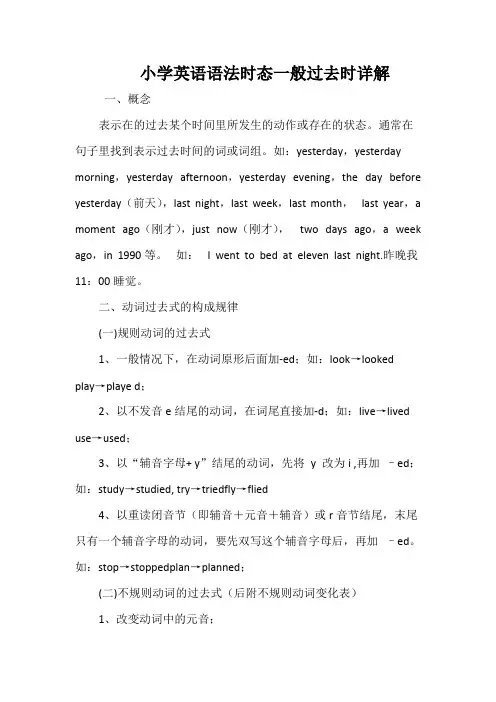
小学英语语法时态一般过去时详解一、概念表示在的过去某个时间里所发生的动作或存在的状态。
通常在句子里找到表示过去时间的词或词组。
如:yesterday,yesterday morning,yesterday afternoon,yesterday evening,the day before yesterday(前天),last night,last week,last month,last year,a moment ago(刚才),just now(刚才),two days ago,a week ago,in 1990等。
如:I went to bed at eleven last night.昨晚我11:00睡觉。
二、动词过去式的构成规律(一)规则动词的过去式1、一般情况下,在动词原形后面加-ed;如:look→looked play→playe d;2、以不发音e结尾的动词,在词尾直接加-d;如:live→lived use→used;3、以“辅音字母+ y”结尾的动词,先将y 改为i ,再加–ed;如:study→studied, try→triedfly→flied4、以重读闭音节(即辅音+元音+辅音)或r音节结尾,末尾只有一个辅音字母的动词,要先双写这个辅音字母后,再加–ed。
如:stop→stoppedplan→planned;(二)不规则动词的过去式(后附不规则动词变化表)1、改变动词中的元音;begin→began drink→drank come→came eat→ate grow→grew run→ran know→knew win→wonspeak→spoketake→took write→wrote get→got2、变词尾的–d 为–t ;build→built lend→lent send→sent spend→spent bend→bent3、与动词原形一样;cut→cut put→put cost→cost hurt→hurt shut→shut4、变-ay 为-aid (少数动词);say→said pay→paid lay→laid5、采用不同词根;sell→sold teach→taught buy→bought6、其他。
(完整版)初中一般过去时详细讲解与练习
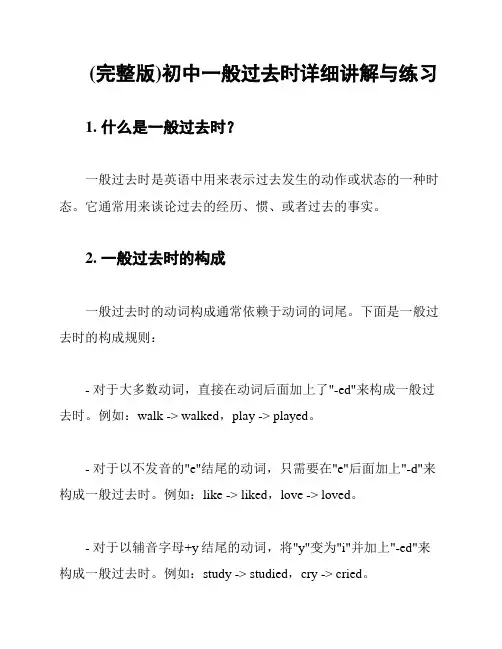
(完整版)初中一般过去时详细讲解与练习1. 什么是一般过去时?一般过去时是英语中用来表示过去发生的动作或状态的一种时态。
它通常用来谈论过去的经历、惯、或者过去的事实。
2. 一般过去时的构成一般过去时的动词构成通常依赖于动词的词尾。
下面是一般过去时的构成规则:- 对于大多数动词,直接在动词后面加上了"-ed"来构成一般过去时。
例如:walk -> walked,play -> played。
- 对于以不发音的"e"结尾的动词,只需要在"e"后面加上"-d"来构成一般过去时。
例如:like -> liked,love -> loved。
- 对于以辅音字母+y结尾的动词,将"y"变为"i"并加上"-ed"来构成一般过去时。
例如:study -> studied,cry -> cried。
- 部分动词的一般过去时需要进行不规则变化。
例如:go -> went,eat -> ate。
3. 一般过去时的用法一般过去时通常用来描述以下情况:- 过去发生的动作:I walked to school yesterday.- 过去的经历:He lived in London for five years.- 过去的事实:She was a teacher in the past.4. 一般过去时的句型练下面是一些练,帮助加深对一般过去时的理解和运用:1. 请用一般过去时填空:Yesterday, I ________ (watch) a movie at home.2. 完成句子:He _____ (visit) his grandparents last summer.3. 改写句子,使用一般过去时:I read a book yesterday. (改为否定句)4. 改写句子,使用一般过去时:They played basketball in the park. (改为疑问句)5. 总结一般过去时是用来表示过去发生的动作或状态的一种时态。
小学英语一般过去时完整版
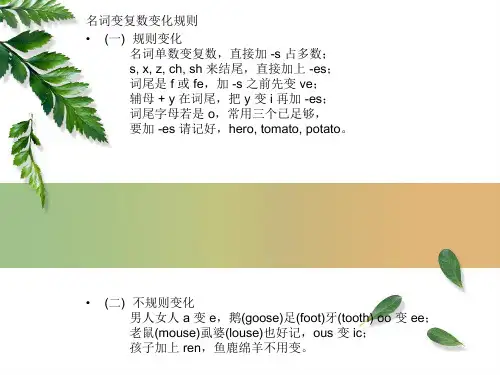
肯定/否定回答: Yes, she did. No, she didn’t.
.
• 3. I read an English book last week.
一般疑问句: • Did you read an English book last week?
否定句: →She didn’t play the violin last night.
肯定句: They swam in the lake yesterday.
否定句: →They didn’t swim in the lake yesterday.
.
一般过去时否定句练习
肯定句: They made a kite a week ago. 否定句:They didn’t make a kite a week ago.
came(掌握) gave became
drink begin
drank(了解) began
.
剩余不规则动词
剩余不规则动词表 Infinitive Past Tense Infinitive Past Tense
am, is are do
go have make get
was were did
went had made got
Worry
Worryied
Early Happy
Earlyied Happyied
.
不规则动词 过去式的构成
1.过去式与原形一样(了解)
put→put (放下) let→let(让) cut → cut(砍,剪) read→read(读)
.
word完整版初中英语一般过去时
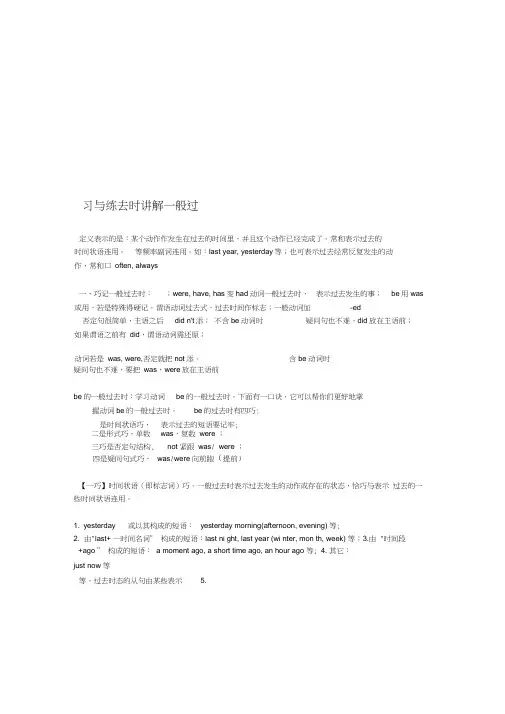
习与练去时讲解一般过定义表示的是:某个动作作发生在过去的时间里,并且这个动作已经完成了。
常和表示过去的时间状语连用。
等频率副词连用。
如:last year, yesterday等;也可表示过去经常反复发生的动作,常和口often, always一、巧记一般过去时:;were, have, has变had动词一般过去时,表示过去发生的事;be用was 或用,若是特殊得硬记。
谓语动词过去式,过去时间作标志;一般动词加-ed 否定句很简单,主语之后did n't添;不含be动词时疑问句也不难,did放在主语前;如果谓语之前有did,谓语动词需还原;动词若是was, were,否定就把not添。
含be动词时疑问句也不难,要把was,were放在主语前be的一般过去时:学习动词be的一般过去时,下面有一口诀,它可以帮你们更好地掌握动词be的一般过去时。
be的过去时有四巧:是时间状语巧,表示过去的短语要记牢;二是形式巧,单数was,复数were ;三巧是否定句结构, not 紧跟was/ were ;四是疑问句式巧,was/were向前跑(提前)【一巧】时间状语(即标志词)巧。
一般过去时表示过去发生的动作或存在的状态,恰巧与表示过去的一些时间状语连用。
1. yesterday 或以其构成的短语:yesterday morning(afternoon, evening) 等;2. 由"last+ —时间名词” 构成的短语:last ni ght, last year (wi nter, mon th, week) 等;3.由 "时间段+ago ” 构成的短语:a moment ago, a short time ago, an hour ago 等; 4. 其它:just now 等等。
过去时态的从句由某些表示 5.【二巧】形式巧。
它与一般现在时一样,形式多样:当主语是第一人称单数或第三人称单数时, 谓语。
(完整版)一般过去时的概念及用法
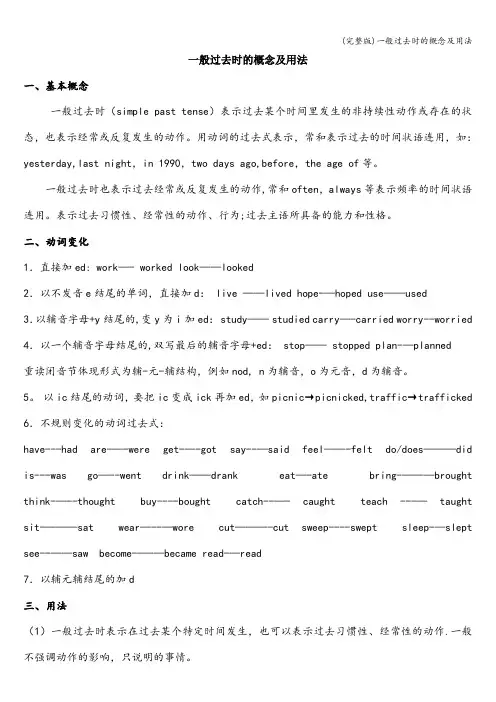
一般过去时的概念及用法一、基本概念一般过去时(simple past tense)表示过去某个时间里发生的非持续性动作或存在的状态,也表示经常或反复发生的动作。
用动词的过去式表示,常和表示过去的时间状语连用,如:yesterday,last night,in 1990,two days ago,before,the age of等。
一般过去时也表示过去经常或反复发生的动作,常和often,always等表示频率的时间状语连用。
表示过去习惯性、经常性的动作、行为;过去主语所具备的能力和性格。
二、动词变化1.直接加ed: work—- worked look——looked2.以不发音e结尾的单词,直接加d: live ——lived hope-—hoped use——used3.以辅音字母+y结尾的,变y为i加ed: study——studied carry—-carried worry--worried 4.以一个辅音字母结尾的,双写最后的辅音字母+ed: stop—— stopped plan-—planned重读闭音节体现形式为辅-元-辅结构,例如nod, n为辅音,o为元音,d为辅音。
5。
以ic结尾的动词,要把ic变成ick再加ed,如picnic→picnicked,traffic→traffic ked 6.不规则变化的动词过去式:have---had are-—-were get-—-got say--—said feel——-felt do/does———did is---was go—--went drink——drank eat—-ate bring-———brought think-—--thought buy----bought catch--—- caught teach ---—taught sit-———sat wear—--—wore cut———-cut sweep----swept sleep-—slept see--——saw become-—-—became read-—read7.以辅元辅结尾的加d三、用法(1)一般过去时表示在过去某个特定时间发生,也可以表示过去习惯性、经常性的动作.一般不强调动作的影响,只说明的事情。
一般过去时(课件)
一般过去时(课件)一般过去时是英语中表达过去某个时间点或时间段发生的动作或状态的一种时态。
在一般过去时中,动词的形式需要根据主语的人称和数进行变化。
一般过去时的句型结构是:主语 + 动词过去式 + 其他。
一、一般过去时的构成1. 规则动词:在动词原形的基础上加上ed。
例如:work → worked, play → played, study → studied。
二、一般过去时的用法1. 表示过去某个时间点发生的动作。
例如:I went to the library yesterday.2. 表示过去某个时间段内发生的动作。
例如:We playedfootball last weekend.3. 表示过去某个时间段内的状态。
例如:She lived in New York for five years.4. 表示过去习惯性动作。
例如:He used to smoke when he was young.三、一般过去时的疑问句和否定句1. 疑问句:将助动词did放在主语之前,动词原形放在助动词之后。
例如:Did you watch the movie last night?2. 否定句:在主语和动词之间加上助动词did,动词原形变成动词的过去式,并在动词过去式前加上not。
例如:I didn't finish my homework yesterday.四、一般过去时的特殊用法1. 过去进行时:表示过去某个时间点正在进行的动作。
例如:What were you doing at 8 o'clock last night?2. 过去完成时:表示在过去某个时间点之前已经完成的动作。
例如:I had finished my work before he came.3. 过去完成进行时:表示在过去某个时间点之前一直在进行的动作。
例如:She had been waiting for two hours when he finally arrived.一般过去时(课件)一般过去时是英语中表达过去某个时间点或时间段发生的动作或状态的一种时态。
(完整版)英语一般过去时和过去进行时
一、一般过去时(一)一般过去时时态(1)主要用来表示过去某一时间发生的(和现在没有联系的)动作或所处的状态,常有一个表示明确的过去的时间状语,如:the day before yesterday, yesterday, last week, three days ago, just now, at that time , in 1999等;或跟由while/when等引导的表示过去的时间状语从句;或有上下文暗示动作发生的时间是在过去①They were in Paris three years ago. 三年前他们在巴黎②When I was at college, I spoke three foreign languages. 上大学的时候,我讲三门外语。
③——Have you seen a pen? I left here this morning,你看见一支笔了吗?今天早上我这的。
——Is it a black one? I think I saw it somewhere. 是黑色的吗?我想我在什么地方见到过。
(2)表示过去经常或反复发生的动作。
①He always got up late on Sundays. 周日他总是很晚才起床。
(3)表示客气,与过去式无关,一般用在情态动词中①Would/Could you please give me a hand?你能帮我一下吗?(二)谓语构成一般过去时的谓语不管主语的人称和单复数都用动词的过去式表示,动词的过去式有规则与不规则两种。
规则动词的过去式在动词原形后加-ed, 不规则动词的过去式要逐个记忆。
规则动词的过去式变化方式如下:begin → began go → went see → saw do → did get → got come →came leave →left am →was are → were give → gave have → had think →thought(三)一般过去时的否定式和疑问式(1)实义动词的一般过去时的否定式和疑问式要用助动词did帮助构成。
初中英语语法-八大时态之一般过去时课件全文
一般过去时疑问句
对于含有是实意动词的句子, 一般疑问句: Did +主语+动词其他…? 特殊疑问句:疑问词+ did(didn’t)+主语+其它? What did you do yesterday? Why did you go there the day before yesterday? Whose father came to see our teacher just now?
Theyw_e_r_e from Japan. I _w_a_s very tired.
4. He is too young to go to school.
Hew_a_s_too young to go to school.
5. You are late for school. Youw_e_r_e late for school.
一般过去时-不含有be动词型
把句子中的动词改为过去式形式。
通常有5种写法。
动词过去式的写法:
01 一般情况词尾加ed 02 e结尾直接在词尾加d 03 辅音加y结尾变y为i加ed 04 重读闭音节结尾双写词尾字母加ed 05 特殊情况
I work in this city. I worked in this city last year.
We are friends.
We weren't friends.
2.当谓语动词是实意动词时,它 与助动词did有关
主语+did + not+ 动词
动词谓语一定要恢复为原形。
一般过去时否定式
主语+did + not+ 动词原型
英语英语一般过去时用法总结完整
【英语】英语一般过去时用法总结(完整)一、单项选择一般过去时1.-Late again! Where?-Sorry, I in the heavy traffic, or I would have been here earlier.A. were you: have got stuckB. have you been; have got stuckC. were you; got stuckD. have you been; got stuck【答案】D【解析】【详解】考查时态。
句意:一一又迟到了?你去哪了?一一对不起,我遇上交通拥挤了,否则我就会早点到。
第一空根据语境“又迟到了”可知,已经回来了,所以用现在完成时态,第二空:短语be/getstuckin被困住,动作发生在过去所以用一般过去式,故选D。
2.— You seem to be familiar with the school campus.—I here for three years. It's great to be back.A. have taughtB. taughtC. had taughtD. teach【答案】B【解析】考查时态。
句意:一一你似乎对这个校园很熟悉。
一一我在这里教过3年学。
回来真是太好了。
根据第一句和It's great to be back.可推知,“在这里教过3年学”是过去发生的事情,现在不教了,故用一般过去时态,答案为B。
3.Chinese kites in ancient times in the shape of birds.A. designB. had designedC. were designedD. have been designed【答案】C【解析】考查时态和语态。
句意:在古代中国的风筝被设计成鸟的形状。
根据in ancient times可知,句子用一般过去时态,根据动词与主语是被动关系,故用一般过去时的被动语态,故选C。
- 1、下载文档前请自行甄别文档内容的完整性,平台不提供额外的编辑、内容补充、找答案等附加服务。
- 2、"仅部分预览"的文档,不可在线预览部分如存在完整性等问题,可反馈申请退款(可完整预览的文档不适用该条件!)。
- 3、如文档侵犯您的权益,请联系客服反馈,我们会尽快为您处理(人工客服工作时间:9:00-18:30)。
【英语】一般过去时(完整版)一、单项选择一般过去时1.When I was in university, I ______ at a loss what to do in the future for a long time.A.had felt B.have felt C.felt D.would feel【答案】C【解析】【详解】考查动词时态。
句意:当我在大学的时候,我很长一段时间都不知道将来该做什么。
结合上文When I was in university可知是发生在大学时候的事情,故用一般过去时。
故选C。
2.Chinese kites in ancient times ________ in the shape of birds.A.design B.had designedC.were designed D.have been designed【答案】C【解析】考查时态和语态。
句意:在古代中国的风筝被设计成鸟的形状。
根据in ancient times可知,句子用一般过去时态,根据动词与主语是被动关系,故用一般过去时的被动语态,故选C。
3.This summer holiday, many foreign students _______ to China for a holiday.A.come B.have comeC.had come D.came【答案】D【解析】考查动词时态。
句意:今年夏天,许多外国学生来中国度暑假。
表示过去时间发生的事,此处是陈述事实,用一般过去时。
故选D。
4.—Mary will not attend the party tonight.—But she she would!A.has promised B.promisedC.will promise D.promises【答案】B【解析】考查动词的时态。
——玛丽今晚不参加聚会。
——但是她许诺她将会来。
根据上文Mary will not attend the party tonight.可知,“promise”这一动作发生在过去,主语she与promise是主动关系。
故选B。
5.Wolf Warrior 2, which ________ the “Award for Best Visual Effects” at the Beijing Film Festival, indicates China's film industry has come of age.A.wins B.wonC.has won D.had won【答案】B【详解】考查动词时态。
句意:在北京电影节上获得“最佳视觉效果奖”的《狼战2》表明中国电影业已经成熟。
因为电影获奖发生在过去,用一般过去时。
故选B.6.I’ve known Sarah for nearly ten years. She _________ once my customer.A.is B.has beenC.was D.had been【答案】C【解析】试题分析:本题考查的是时态。
句意:我认识Sarah 近十年了。
她曾经是我的一个顾客。
根据句意可知,Sarah 曾经是我的一个顾客,即现在不是了,所以选择C was 一般过去时,表示过去的事实, A is 表示现在的事实; B has been 过去发生的动作,但是现在仍然是D had been 过去的过去。
考点:考查时态7.---- Have you ever been to Provence which is home to lavender(薰衣草) in Paris?---- Yes, only once. I ________ there for a week.A.had stayed B.were staying C.have stayed D.stayed【答案】D【解析】【详解】考查时态。
句意:—你去过巴黎薰衣草的故乡普罗旺斯吗?—是的,只有一次。
我在那里呆了一个星期。
此处是指过去发生的一件事,与现在无关,所以用一般过去时态,故答案为D。
8.I _______ you not to touch my ink---now it’s spilt and my paperwork has been spoiled. A.tell. B.have told. C.told. D.was telling.【答案】C【解析】【详解】考查动词时态。
句意:我告诉过你不要碰我的墨水——现在墨水泼出来了,我的文件也被弄脏了。
此处强调过去发生的事,用一般过去时。
故选C.9.---I’m sorry, my mind _________. What _________ you _________?---You are always absent-minded in class.A.am wandering; do; say B.wandered; had; saidC.wandered; did; say D.was wandering; did; say【答案】D句意:----对不起我刚才正在走神呢。
你刚才说了什么?----你上课的时候总是走神。
第一个空用过去进行时,意思是在对方说话的时候,我正在走神,说明是进行时。
因为说话是在刚才,也就是过去,所以要用过去式.;第二个空选择一般过去式,就是问对方,刚才说了什么,只是询问刚才说过的话而已。
故选D。
10.(天津) Only when Lily walked into the office_________that she had left the contract at home.A.she realized B.has she realizedC.she has realized D.did she realize【答案】D【解析】【详解】考查倒装。
句意:只有当莉莉走进办公室的时候,她才意识到她把合同忘家里了。
本题考查only放在句首的部分倒装,在句首的only如果后面跟了副词、介词短语或从句等状语,则主句用倒装结构。
但如果only后跟的是主语,就不用倒装结构了。
根据句中的其他动词时态,可判定用过去时态。
故选D。
11.—What do you think of the Great Wall of China?—Splendid! When I was in Beijing, I ________ it twice.A.had visited B.visitedC.have visited D.would visit【答案】B【解析】【详解】考查时态。
句意:——你认为中国的长城怎么样?——好极了!在北京的时候我参观过两次。
根据“When I was in Beijing”可知,此处用一般过去时,故B项正确。
12.—What do you think of the movie?—It’s fantastic. The only pity is that I ________ the beginning of it.A.missed B.had missed C.miss D.would miss【答案】A【解析】考查动词时态。
从创设的语境来看电影已演完,句意“唯一的遗憾是错过了开头”说话者在陈述过去事实,构成现在和过去的对比,选A。
13.While watching TV, ______.A.someone came in B.the telephone rangC.we saw someone coming in D.someone appearing【答案】C【解析】【详解】考查动词时态。
句意:在看电视的时候,我们看见有人进来了。
while引导时间状语从句,后面是主句,且从句和主句主语一致都是we,且根据句意应用一般过去时,故选C。
【点睛】当分词做状语的时候,如果构成分词的动词与句子的主语构成主动关系,就使用现在分词做状语;当二者构成被动关系,使用过去分词做状语。
如果分词的动作发生在谓语动词之前,就使用分词的完成式。
如果分词与句子的主语没有关系,可以使用状语从句或者独立主格结构。
14.—You’re late again.—Sorry. I ________ to set my alarm clock.A.forget B.will forgetC.forgot D.would forget【答案】C【解析】考查动词时态。
上句:你又迟到了。
下句:对不起,我忘了设定闹钟。
根据语境可知,“忘记”是过去的一件事情,所以句子用一般过去时态,故选C。
15.Jessica had intended to go bungee jumping, but on second thoughts, she _____ the plan. A.was canceling B.cancelsC.canceled D.has canceled【答案】C【解析】【详解】考查动词时态。
句意:Jessica 本打算去蹦极的,然后她想了想,又取消了该计划。
由前半句“had intended to” 可知前半句的时态为过去完成时,表示过去的过去,因此后半句为一般过去时,表示“取消计划”这一动作发生在“打算去蹦极”之后。
故正确答案为C。
16.Not only ______ a promise ,but she also kept it.A.did she make B.she made C.does she make D.had she made【答案】A【解析】本题考查倒装和时态。
Not only提前,用部分倒装结构。
句意为:他不仅许下了诺言,而且还坚守了诺言。
17.—Ann is in hospital.—Oh, really? I ________ know. I ________ go and visit her.A.didn’t; am going to B.don’t; wouldC.don’t; will D.didn’t; will【答案】D【解析】【详解】考查时态。
句意:—Ann住院了。
—真的吗?我不知道啊。
我要去看她。
根据句意,“不知道她住院”是过去的动作,应使用一般过去时;“我要去看她”是将来要发生的事情,而且是临时决定做的事情,应使用will表将来。
故D正确。
18.—Did Jackson mend the computer himself?—He________, because he knows nothing about computers.A.mended it B.had mended it C.had it mended D.has it mended【答案】C【解析】【详解】考查时态和非谓语动词。
